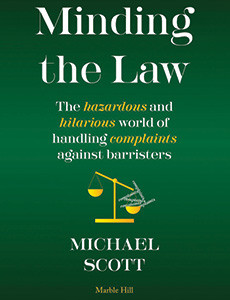*/

David Etherington KC talks to Michael Scott about his experiences as Lay Complaints’ Commissioner for the Bar 1997-2006
I saw it advertised in The Times. It seemed to me to be a procedure involving a non-legal, common-sense approach to problems; dealing with matters governed by strict rules; answering to a disciplinary committee and, from time to time, handling disappointed complainants or barristers.
No, I’ve written four previous books, mainly on individuals in history with a strong military background. This one started as a chapter in the book I’m writing for my granddaughter but then took on a life of its own.
To some extent the previous system was, certainly in the eyes of the public, seen as barristers dealing with barristers.
I was very conscious of confidentiality, so I only name one complainant, a colourful character, who gave me permission to do so. Nor are barristers named except one who wrote a book on how to defend yourself as a barrister if disciplined, and the excellent member of the Professional Conduct Committee (PCC) who defended me in court. Others identified are those involved in the difficulties over the Iraq War whose names were already in the public domain.
IPS was designed to cover breaches of the Code which might not be considered serious enough to merit a finding of professional misconduct. Examples included delay, rudeness, late attendance at court and similar behaviour which caused worry and inconvenience to the lay client. Remedies for IPS ranged from a formal apology from the barrister to the lay client, reduction in fees and compensation up to £2,000.
Unless the complaint was complete nonsense, my initial action was to send the papers to the barrister concerned and ask for their comment. I did the same with their instructing solicitor. On receipt of their replies, I could make a decision as to whether it deserved dismissal or whether I needed professional help. If the latter, I went to a member of the PCC for advice. Sometimes that came back suggesting dismissal, with grounds for doing so, or said there was something in it. It was then referred to the PCC.
I had a very good team of Executive Secretaries with wide experience, together with a pair of in-house solicitors. So, they would be my first port of call for assistance and discussion. Then I would approach a member of the PCC with the right area of expertise.
As far as the barristers were concerned, I used to give lectures and write articles for Counsel on how to avoid my clutches. For example:
Courts: the courts are bread and butter to you, but to your client they are terrifying places even in the cosiest judge’s chambers, and they wish to leave them as quickly as possible – hence maybe losing concentration. So ensure your client is listening and actually taking in what you are saying. Don’t talk ‘over’ your client to your instructing solicitor or talk loudly in public places about their private affairs.
Consent orders: if there is any doubt in your mind that your client is being fluffy, get them to sign the draft. So often, when the client eventually sees the typed version, they say ‘I never agreed to that!’
Financial outcome: Ensure your client knows exactly what the deal is, down to the last penny.
Negotiation: Much of your work, quite properly, will be negotiating with the other side to reach agreement where possible. Explain that it is often better to avoid actually going into court if possible.
Child contact: Make absolutely certain that you and your client totally understand each other when negotiating time/place of, say, pick-up; and who has the child for how long.
Generally: Remember that once a barrister, always a barrister unless you are disbarred.
Many complainants refused to accept my decision and that was very understandable; you have reached the end of the road in your devastating problem and all Scott does is push you over the precipice. Barristers, on the whole, knew the angles and if they had erred, so I had very few bad reactions. Curiously, I did, occasionally, strike up a friendship with a complainant, in the longest distance terms.
Yes. Most of my time it was Zahida Manzoor. She was very fair and on the few occasions she criticised, it was justified. We got on well but we were careful of each other; an armed neutrality.
I have no direct experience of the new system but, from reports, it seems to me to be more impersonal and bureaucratic than when I handled complaints.
Yes. I did enjoy it. I was working with people of very high standards and integrity, softened with understanding and compassion. Also with that key ingredient, a sense of humour.


I saw it advertised in The Times. It seemed to me to be a procedure involving a non-legal, common-sense approach to problems; dealing with matters governed by strict rules; answering to a disciplinary committee and, from time to time, handling disappointed complainants or barristers.
No, I’ve written four previous books, mainly on individuals in history with a strong military background. This one started as a chapter in the book I’m writing for my granddaughter but then took on a life of its own.
To some extent the previous system was, certainly in the eyes of the public, seen as barristers dealing with barristers.
I was very conscious of confidentiality, so I only name one complainant, a colourful character, who gave me permission to do so. Nor are barristers named except one who wrote a book on how to defend yourself as a barrister if disciplined, and the excellent member of the Professional Conduct Committee (PCC) who defended me in court. Others identified are those involved in the difficulties over the Iraq War whose names were already in the public domain.
IPS was designed to cover breaches of the Code which might not be considered serious enough to merit a finding of professional misconduct. Examples included delay, rudeness, late attendance at court and similar behaviour which caused worry and inconvenience to the lay client. Remedies for IPS ranged from a formal apology from the barrister to the lay client, reduction in fees and compensation up to £2,000.
Unless the complaint was complete nonsense, my initial action was to send the papers to the barrister concerned and ask for their comment. I did the same with their instructing solicitor. On receipt of their replies, I could make a decision as to whether it deserved dismissal or whether I needed professional help. If the latter, I went to a member of the PCC for advice. Sometimes that came back suggesting dismissal, with grounds for doing so, or said there was something in it. It was then referred to the PCC.
I had a very good team of Executive Secretaries with wide experience, together with a pair of in-house solicitors. So, they would be my first port of call for assistance and discussion. Then I would approach a member of the PCC with the right area of expertise.
As far as the barristers were concerned, I used to give lectures and write articles for Counsel on how to avoid my clutches. For example:
Courts: the courts are bread and butter to you, but to your client they are terrifying places even in the cosiest judge’s chambers, and they wish to leave them as quickly as possible – hence maybe losing concentration. So ensure your client is listening and actually taking in what you are saying. Don’t talk ‘over’ your client to your instructing solicitor or talk loudly in public places about their private affairs.
Consent orders: if there is any doubt in your mind that your client is being fluffy, get them to sign the draft. So often, when the client eventually sees the typed version, they say ‘I never agreed to that!’
Financial outcome: Ensure your client knows exactly what the deal is, down to the last penny.
Negotiation: Much of your work, quite properly, will be negotiating with the other side to reach agreement where possible. Explain that it is often better to avoid actually going into court if possible.
Child contact: Make absolutely certain that you and your client totally understand each other when negotiating time/place of, say, pick-up; and who has the child for how long.
Generally: Remember that once a barrister, always a barrister unless you are disbarred.
Many complainants refused to accept my decision and that was very understandable; you have reached the end of the road in your devastating problem and all Scott does is push you over the precipice. Barristers, on the whole, knew the angles and if they had erred, so I had very few bad reactions. Curiously, I did, occasionally, strike up a friendship with a complainant, in the longest distance terms.
Yes. Most of my time it was Zahida Manzoor. She was very fair and on the few occasions she criticised, it was justified. We got on well but we were careful of each other; an armed neutrality.
I have no direct experience of the new system but, from reports, it seems to me to be more impersonal and bureaucratic than when I handled complaints.
Yes. I did enjoy it. I was working with people of very high standards and integrity, softened with understanding and compassion. Also with that key ingredient, a sense of humour.

David Etherington KC talks to Michael Scott about his experiences as Lay Complaints’ Commissioner for the Bar 1997-2006


The Chair of the Bar sets out how the new government can restore the justice system
In the first of a new series, Louise Crush of Westgate Wealth considers the fundamental need for financial protection
Unlocking your aged debt to fund your tax in one easy step. By Philip N Bristow
Possibly, but many barristers are glad he did…
Mental health charity Mind BWW has received a £500 donation from drug, alcohol and DNA testing laboratory, AlphaBiolabs as part of its Giving Back campaign
The Institute of Neurotechnology & Law is thrilled to announce its inaugural essay competition
How to navigate open source evidence in an era of deepfakes. By Professor Yvonne McDermott Rees and Professor Alexa Koenig
Brie Stevens-Hoare KC and Lyndsey de Mestre KC take a look at the difficulties women encounter during the menopause, and offer some practical tips for individuals and chambers to make things easier
Sir Geoffrey Vos, Master of the Rolls and Head of Civil Justice since January 2021, is well known for his passion for access to justice and all things digital. Perhaps less widely known is the driven personality and wanderlust that lies behind this, as Anthony Inglese CB discovers
The Chair of the Bar sets out how the new government can restore the justice system
No-one should have to live in sub-standard accommodation, says Antony Hodari Solicitors. We are tackling the problem of bad housing with a two-pronged approach and act on behalf of tenants in both the civil and criminal courts